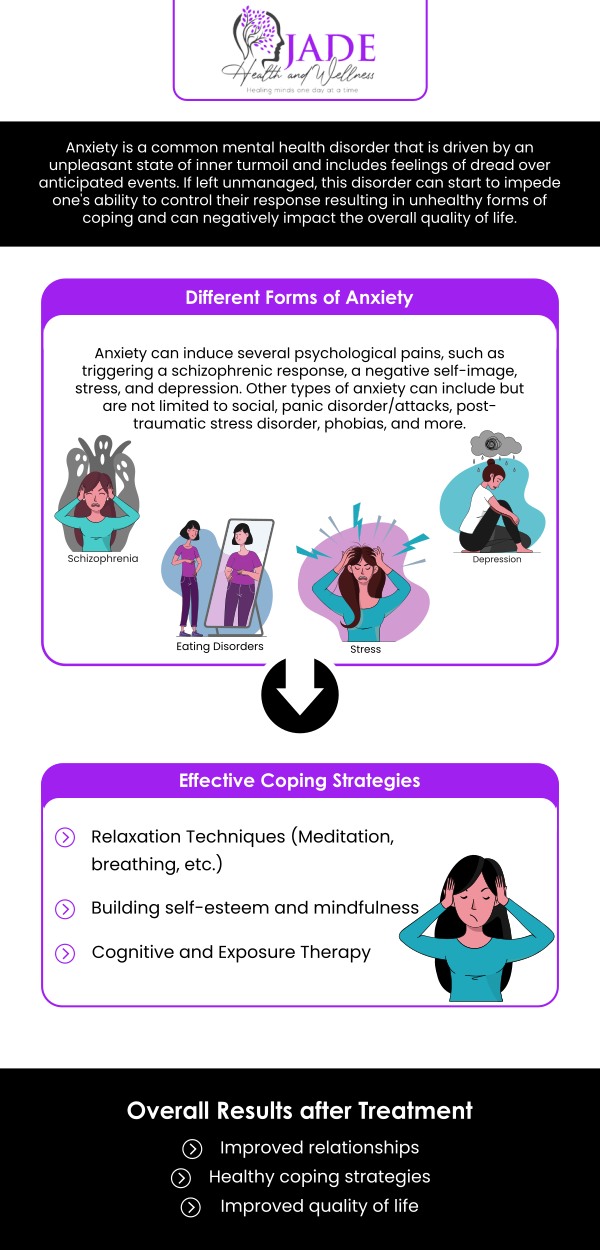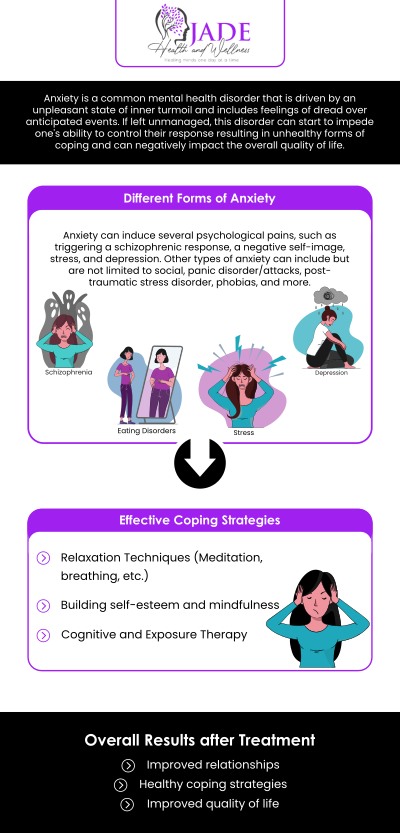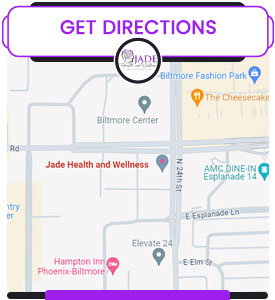Anxiety Disorders Treatment Specialist in Phoenix, AZ
Around 31.1% of people in America suffer from anxiety at some point in their lives. Having panic attacks, restlessness, increased heart rate, tiredness, and lack of concentration are some signs of anxiety disorder. If you have any of these symptoms, you can talk to Dr. Courtney Gaines at Jade Health and Wellness. For more information, contact us today or book an appointment online. We are conveniently located at 2375 East Camelback RD Suite 600 Phoenix, AZ 85016.




Table of Contents:
What are anxiety disorders?
What types of anxiety disorders are there?
What are the symptoms of anxiety disorders?
When should you see a therapist for anxiety disorders?
Everyone feels anxious from time to time. It’s a normal part of life. We depend on the body’s fight or flight response to help us deal with challenging situations. At moderate levels, anxiety can motivate you to achieve your goals, solve problems, and stay focused, but if those feelings of worry persist and intensify over time and end up interfering with your daily life, you may be dealing with an anxiety disorder.
The term “anxiety disorder” refers to a group of psychiatric disorders that result in extreme fear or worry and can be caused by both genetic and environmental factors. Although Researchers aren’t entirely sure what causes them, according to the National Institute of Mental Health, you’re more likely to develop an anxiety disorder if:
• you’ve had traumatic life experiences
• you have a physical disorder that is linked to anxiety, such as thyroid disease
• you have a family history of anxiety disorders or other mental illnesses
According to the U.S. Department of Health & Human Services, the five major types of anxiety disorder are:
• Generalized Anxiety Disorder (GAD) – chronic anxiety, and intense worry and tension, often for no reason
• Obsessive-Compulsive Disorder (OCD) – recurring, unwanted thoughts (obsessions) and/or repetitive behaviors (compulsions).
• Panic disorder – unexpected and repeated episodes of intense fear accompanied by physical symptoms that may include chest pain, elevated heart rate, palpitations, shortness of breath, dizziness, or abdominal distress.
• Post-Traumatic Stress Disorder (PTSD) – can develop after exposure to a traumatic event in which serious physical harm has either occurred or was threatened.
• Social Anxiety Disorder (or Social Phobia) – crushing anxiety, or extreme self-consciousness, in everyday social situations.
Other types of anxiety disorders include agoraphobia, selective mutism, and separation anxiety.
Symptoms differ with the type of disorder. Some have symptoms common with others, whereas certain disorders such as agoraphobia have specific symptoms.
The following are some, but not all, of the common symptoms experienced with the five main types of anxiety disorder:
Generalized Anxiety Disorder
• Feeling restless, wound-up, or on edge
• Being easily fatigued
• Having difficulty concentrating
• Feeling irritable
• Muscle tension
• Difficulty controlling feelings of worry
• Sleep problems, such as difficulty falling or staying asleep, or inadequate sleep
Obsessive-Compulsive Disorder (OCD)
• Obsessions – recurring, unsettling thoughts or impulses
• Compulsions – repetitive acts that temporarily alleviate the stress and anxiety caused by the obsessions.
Panic Disorder
• Heart palpitations, or an accelerated heart rate
• Sweating
• Trembling or shaking
• Feeling short of breath
• Feelings of smothering, or choking
• Feelings of impending doom
• Feelings of being out of control
Post-Traumatic Stress Disorder (PTSD)
• Flashbacks of the event
• Vivid, unpleasant memories of the event
• Frequent nightmares about the event
• Staying away from people, places, or situations that remind you of the event.
• Trouble concentrating
• Easily startled
• Over-reacting when startled
• Irritability
• Bouts of anger
• Negative thoughts about self
• Distorted or disproportionate feelings of guilt, worry or blame
Social anxiety disorder (or Social Phobia):
Physical symptoms:
• blushing
• nausea
• excessive sweating
• trembling or shaking
• difficulty speaking
• dizziness or light-headedness
• elevated heart rate
Psychological symptoms:
• intense worry about social situations
• being stressed for days or weeks before an event
• avoiding social situations
• trying to be inconspicuous if you have to attend a social event
• fear of embarrassing yourself in a social situation
• being overly concerned that other people will notice that you are stressed or nervous
• needing alcohol to calm nerves
It is recommended that you see a therapist if, among other things:
• you are feeling constantly overwhelmed
• your physical health is suffering
• you have difficulty in building or maintaining relationships
• you’re over-emotional
• your academic or professional life is being negatively impacted
• you’ve experienced trauma
For more information, contact us today or book an appointment online. We are conveniently located at 2375 East Camelback RD Suite 600 Phoenix, AZ 85016. We serve patients from Phoenix AZ, Scottsdale AZ, Paradise Valley AZ, Alhambra AZ, Tempe AZ, and surrounding areas.


Additional Services You May Need
▸ ADHD/ADD
▸ Anxiety Disorders
▸ Bipolar Disorders
▸ Borderline Personality Disorder
▸ Depression Disorders
▸ Eating Disorder
▸ Grief Therapy
▸ Life Coaching
▸ Men’s Mental Health
▸ Mental Health Therapy
▸ Mood Disorders
▸ OCD Disorders
▸ PTSD Disorders
▸ Panic Disorders
▸ Stress Disorders
▸ Talk Therapy
▸ Women’s Mental Health
▸ Social Phobia


